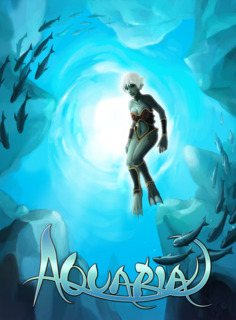Aquaria is perhaps the best indie game ever. And that's coming from one who has played a lot of them.
Aquaria, the product of two developers Alec Holowka and artist Derek Yu who also runs indie game blog TIGSource, was the IGF Grand Prize Winner in 2007, and after you sink into the depths of this game, immerging yourself and taking it all in, it's not the least bit surprising. What's surprising is that unless you're an indie game follower, you've likely never heard of this masterpiece. And that's a true shame, because it's one of the very best games I've ever had the privilege to play. Peroid.
The most frequent comparison other reviewers have made is to Super Metroid, one of the greatest games ever to grace a screen, and I must say such comparisons are not only apt in terms of describing the gameplay, but similarly to how deeply atmospheric this game is. Just leaving it at that, however, though it may wet your appetite, doesn't quite capture Aquaria's uniqueness. Seamlessly blending skill discovery, map exploration, item gathering, alchemic cooking, mysterious mythology, and some very mean (though infrequent) boss fights, all in an underwater wonderland, Aquaria feels effortless in its triumphs and doesn't have that cut-and-paste feel that is the residue haunting most low-budget indie games.
But let us come closer to the meat of things. In Aquaria you play as Naija, an aquatic pubescent, who has taken it upon herself to explore her world and discover the sedemented past of her people. Using a system of mouse/keyboard to move and interact, a control system that works really well once you get the hang of it, you set out for discovery. Yet from the outset, this is not your everyday platformer. For instance, when you begin you have no offensive capabilities at all (such has yet to be discovered). Instead, Naija can sing, and through using the mouse you can bring up a wheel that is color/note coordinated. Though initially this is useful for prompting sea-flowers to offer up their contents (leaves for wrapping food, etc) soon enough you'll discover once lost songs which you'll use to interact with the world (dragging objects through the water, for instance) and morph with the power of ancients.
Through her musical abilities, using the color of the note to interact with the world and learning new songs of transformation, Naija thus sets out in a large subterranean landscape where she'll need to unlock the secrets of new songs which will bequeath her the abilities to enter yet-undiscovered areas of the map. Which is of course very Super Metroid in terms of the exploratory method. As you venture out, you'll gather plant and sea life for food (which is then cooked if you have gathered appropriate recepies) and eventually have the means to fire back when fired upon, often leaving glowing orbs which also restore your health. The save mechanic is location specific, requiring you to locate giant red gems which store your progress/memories. And while much of the game doesn't require constant combat, you'll certainly never know what lurks in the next cave-section, so saving often should still be a priority for you.
As noted previously, Aquaria is a heavily atmospheric game, thanks in large part to the incredibly beautiful hand-drawn artwork and strong yet ambient musical score. The artwork, in particular, deserves a lot of credit for the success of the game. Through your travels, you'll continually stumble upon underwater dreamscapes and ancient strongholds, which will give each turn around the bend a sense of inquisitive expectation for the next wondrous scene you may behold. Even the infrequent cut-scenes are spot-on, using still images rather than gameplay footage, in montages that often fill in some of the mysteries of the past. Furthermore, all of the sea creatures and other aquatic life really feels natural and well placed, leaving the rare bosses you'll encounter to jump off the screen through their strangeness, color pattern and design, and their immense size in comparison to previous encounters, granting them a visceral realization of the unfolding mythology: true giants of the underwater realm.
Will all that this game presents, there are surprisingly few places in which Aquaria feels slightly off key. The easiest critique being that some of the colors in the musical wheel are too similar to be discerned easily, leading to trial and error at times. Also, as is endemic to this genre, figuring out how to proceed isn't always straightforward, and will at times take longer to figure out than you may like if you never consult a walkthrough.
Bottom Line: If you enjoy exploration of incredibly scenic environments with thick atmosphere, narratives of the discovery of forgotten ages, and the steady and consistent increase in skills, items, and abilities, then Aquaria is the game for you. Stronger than almost every other indie game out there to date, Aquaria is truly a vision. If you pass this one up, you're truly missing out.
Rating 9.7/10

